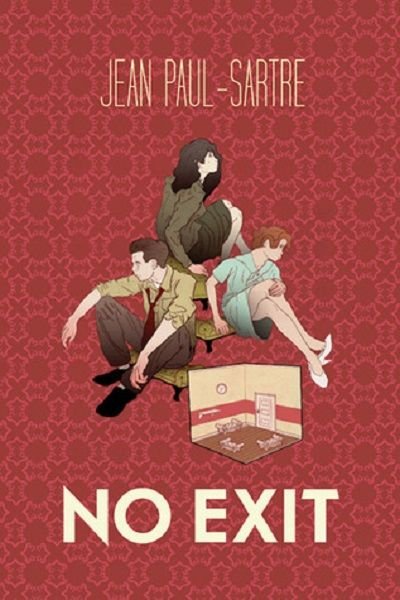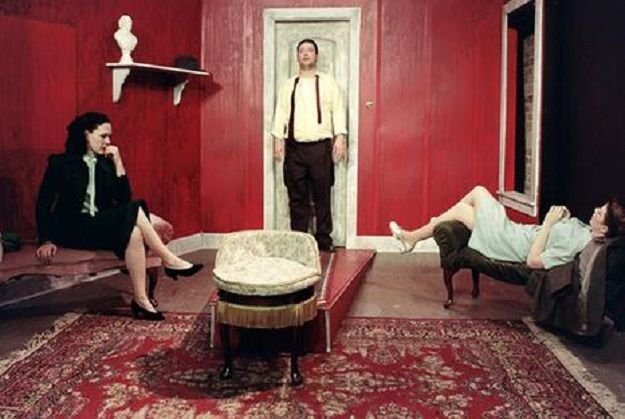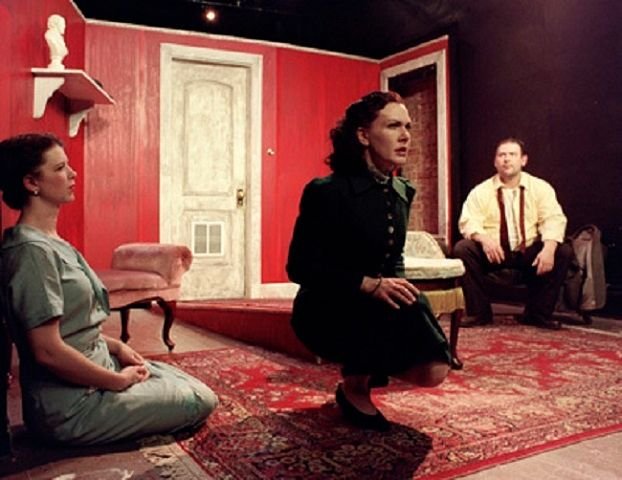In Sartre and the Theater of Existentialism, we observe a destruction of the dramatic form, disrupt the dialogical space between the characters, and that lead to a crisis of the relationship between object and subject. The main belief in the philosophy of existentialism is that life doesn't make sense - everyone is alienated from everyone else. As a consequence, every person is forced to define himself, because "existence precedes the essence", as Sartre says, what is the result of our choice, not the opposite. Once everyone is free to determine himself, he is also fully responsible for who he is and what he does. The fear and anxiety of this responsibility leads many people to ignore freedom and responsibility by letting others make their choices. That's why Garcin / "No Exit" / is not able to leave the room when he opens the door. He can not oppose Ines and leaves her to determine his decision. Likewise, Estelle thinks it does not exist until it is visible in the mirror. When Ines wants to be her mirror and says that Estelle has something on her face, Estelle allows someone else to recreate it and transform her essence.

In the play of Sartre - "No Exit" the story unfolds in a room in Hell. After the three people (Garcin , Ines and Estelle) are forgotten on the ground, they are now free to define themselves. They then realize that they are unable to do so because the presence of others determines them by what they see and know about them. Full confession of committed sins does not help to save them, since their actions have defined them once and for all. "Man is condemned to be free", Sartre wrote. They are not only "sentenced to be free" but are ready to condemn each other to avoid their freedom. We change through the eyes of others, they build us according to their notion, and finally we begin to accept their value system. We do not acquire the responsibility until the moment when values are created by the other, not ourselves. According to Sartre, every situation gives the opportunity and the responsibility to choose one's own, what to do. Responsibility in this case is a personal act and nothing from the surrounding world can serve as a justification for failure. This choice according to Sartre is the main characteristic of the free person.

"No exit" by Jean-Paul Sartre
"No Exit" the theme of freedom is at the heart of the play. Here, however, is the boundary that implies the freedom of society itself and the communication with the other. "hell is other people," Garcin says when he sees that all the exits to salvation are closed to him. The punishment of the three has nothing to do with Dante's "Inferno". The punishment is invisible to the eyes, though their eyes, when they enter this hell of a hotel room, remain open forever to see everything. Hell, this is the look of the other who watches and judges us what we are. Their eyes to remain forever perceptible are the basis of their punishment. They can not even blink once, constantly present at this moment. The punishment for the three is just the contact between them. A contact that gives rise to fear and hatred and useless attempts to rescue love affection. The reason they are in hell is their sins while living with their loved ones. Estelle kills the child she did not want, Ines - psychic harassment, and Garcin has committed a treachery of cowardice. They are condemned to torture the rest and to be tortured by them. Every desire they have is mercilessly rejected by the other. Innes seeks the sympathies of Estelle, who rejects her, because her desire is directed at Garcin, who closes this cursed triangle with the desire to receive Ines' acknowledgment, which, in order to be denial, despises him. In this atmosphere of contempt and desire, everyone seeks the other's sympathy, but is hurt when he goes to want it.

"No exit" by Jean-Paul Sartre
By the end of the play, Garcin is faced with the choice of going out of the door of this hell of dependence on the two women or staying with them. Only he faces this choice, women remain static in it. Sartre identifies the denial of consciousness with human freedom. The fact that we can move beyond what we are to what we are not claim to be freedom. The idea clearly shows up in the play that we are rather what we get from what we are. Our existence precedes the formation of our essence. We deny what we have been to try to become what we are not. Sartre talks about radical freedom - you can do whatever you want, but with this freedom comes the heavy responsibility. "No Exit" is a glance at the unsuccessful attempt to be free. According to Sartre, we are responsible for achieving what we can from the world. Because such a responsibility raises fear, our freedom can awaken and we will try to escape it, as Garcin does. Sartre calls this escape "bad faith." Unlike the lie - a situation where I know the truth and I try to hide it from others - "in bad faith," Sartre says, "I hide the truth from myself." When we deny ourselves by ignoring or suppressing the fact that our free solutions are decisive in determining the situations in which we are, bad faith intervenes. For this and the play, all interpersonal relationships are in complete failure.
Comparison of alienation in the modern theater
The alienation in the theater since Chekhov has so far a similar function - to seek the real experience, to break away from the falsity of human relationships in search of something innermost. Chekhov reveals in depth the psychological processes behind the outer layer of the difference between the characters. For Sartre, the alienation is interesting, above all, as an existential category, as a situation in which the characters are challenged by choice and are responsible for the consequences of this choice. Absurdists consider the alienated position of the individual with the world and the other. Language has lost its capacity as a means of communication, everyone is unable to understand the language of the other. With Pinter, speech is used as a tool to conceal the truth. For Pinter, as we are closer to silence, we are closer to the truth. His personalities don't have the essence, so they put different masks-roles to conceal the alienation of themselves. A major feature of all the allegiance of the authors is the imitation of dialogue. The dialogue is actually missing. Although communication is increasingly apparent, the truth is, if one looks behind this appearance, that everyone speaks and hears only his own voice. What Dostoevsky has expressed through the dynamism of his dialogues, the clash of contradictions and sparking truths that come from them is gone. There is only a hollow echo of what has been said. The difference in the alienation between Harold Pinter and Ionesco is that Pinter is looking for the danger of communication, not the inability. For Pinter, silence is one of the best ways to communicate. Under Ionesco , the relationships are simulative. They lack the psychology of relationships, as is the case with Chekhov. The contact, though it is here, is devoid of content. We see deepening alienation. In Chekhov contact is a lack of empathy, but he gives access to self-reflection. At Ionic, this bridge was destroyed by alienation. In Chekhov the dialogue is devoid of significance, the monologues stand out. They are stylized as replicas. Between the characters, no connection is born, in any case, no oath in love does not come true, but the lonely flame in the hostile city remains. In Sartre, opposite to Chekhov, forced by the outside world, dialogue in interpersonal relationships is reversed. The limited environment deprives people of a space in which to be with themselves and their monologues. In Sartre play, the dialogue is at the other pole, talking to someone literally hurts the other, breaking through his imprisonment and forcing him to answer. In Sartre, he seeks the way back to classics, breaking the attitude of domination between environment and man, he radicalizes alienation. The environment of him, unlike other authors, turns into a situation. The person, who is no longer connected with the environment, remains free in the foreign situation, but nevertheless his situation.

Waiting for Godot by Samuel Beckett
After all, what is the language? When there is a lack of compatibility between people and the creator in a given period, the language is declining, and the culture itself is declining. This is the first sign of decline, as a result of which people will gradually lose their ability to express themselves and then to feel and experience the emotions of civilized beings. Thus we lose touch with all the cultural heritage and the words with which it was expressed become incomprehensible and meaningless. Finally, this loss of sensibility leads to the usability of the world. Here we can remember Eliot's "The hollow men" or Spengler's thoughts about the Te decline of the West. I think that the art in which alienation takes precedence is precisely this idea of the disappearance of the inherent European values and their replacement with a representation of man as a consumer who does not have time to deepen himself in the dynamics of public life yours.
When you wrote "By the end of the play, Garcin is faced with the choice of going out of the door of this hell of dependence on the two women or staying with them. " it really is a sort of definition of the human condition. How man is the maker of his world and his own hell by the reaction and interaction with the others that populate his sphere of life. If such a sphere, through these interactions, create a hell, that person has the 'freedom' to leave that hell, but another new sort of might possibly be beyond. Therefore, if you are the maker of hell you may very well carry it with you.
In some ways, though it might seem trite, it makes me think of the the old adage, "You are better off with the Devil you know then the one you don't"
Lovely well written piece, really enjoyed it.
Sartre is one of my favourite philosophers. I'm really glad I can read something about here in steemit. Thank you @godflesh
Nice to hear that :) Sartre was the first person with which I entered in the literature and philosophy, and I respect him very much. What do you think about "Nausea"? This is one of my favorite books.
This is a very deep and interesting post. I enjoyed it even thoguh I will need to do some reading to catch up with the people discussed. But very thought provoking. Thanks.
You are welcome :)
Well, yes, the subject is too complex. :) I recommend to you to read some philosophical system about alienation. The alienation in theater is very difficult and slow to enter in it . Beginning with the philosophy of existentialism can really be useful for you.
Thank you for your time. :)
This post has received gratitude of 6.23 % from @appreciator thanks to: @godflesh.